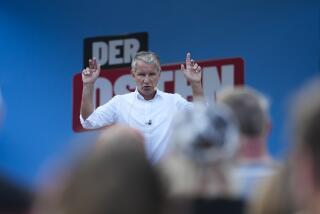Vote Clears Barrier to 1 Germany : NEWS ANALYSIS
EAST BERLIN — Sunday’s East German elections mark the real start of the German reunification process.
Outgoing Communist caretaker Prime Minister Hans Modrow ran his weak, transitional government with a dignity that won the respect of many in both Germanys, but he had neither the legitimacy to take major decisions nor the power to stop the sense of drift and uncertainty that has so clouded the country’s hard-won freedom.
Because of this, substantive talks on such gut issues as a currency union, building a market economy and the modalities of unity itself have had to wait for a popularly elected government in the East.
The rate of business activity across the German divide has jumped significantly, but now it is expected to take off.
“The starting shot (for business) will come after March 18,” West German Economics Minister Helmut Haussmann told a news conference at the Leipzig Trade Fair last week.
For Americans long since bored by endless election campaigns, it’s hard to understand what the free vote means to those who have been denied it.
For many East Germans who exercised that precious right for the first time Sunday, it brought a visible pride, but also heightened expectations.
Political analysts here believe that meeting those expectations without stirring more anxiety in Europe is a challenge that will fall as much on the shoulders of West German Chancellor Helmut Kohl as on the political neophytes elected to lead East Germany toward unity.
The 400 members of the new East German Parliament face a series of urgent tasks.
They must build a new government quickly.
The unexpectedly clear victory of the moderate-right coalition is likely to ease this work, but Lothar de Maiziere, the Christian Democratic leader and possible prime minister, has already indicated he hopes to draw his principal opponents, the Social Democrats, into the government.
Success would add legitimacy to the tough decisions it must face in the months ahead; failure or petty political infighting could quickly erode support and darken a public mood that is already conspicuously volatile.
Once in place, analysts believe the new government’s top priority is to bolster public confidence.
Such a move is needed to stop the stream of East Germans who, on election eve, were still giving up at a rate of about 2,000 each day and fleeing to West Germany.
In his election night statements, Kohl virtually pleaded with East Germans to stay put.
This plea is likely to be helped if the West German state governments go ahead with proposals to cut off preferential treatment of East German refugees as soon as elections were over.
However, positive measures, such as a clear outline of the way forward on currency union and the restructuring of the economy are needed to ease uncertainties about the basics of life, including jobs, housing and the value of personal savings accounts.
On the delicate path to unity, East Germany’s new leaders must also somehow manage what they failed to do in the campaign--fend off the overwhelming embrace of their rich, powerful and eager West German cousins.
The widespread belief among East Germans that West German parties had muscled in on the campaign generated ill will, but this ill will would be dwarfed by the disillusionment of wholesale annexation.
In a recent interview with a group of European newspapers, West German President Richard von Weizsaecker warned that what he termed a “process of economic annexation” could inject a disease into a united Germany.
For many here, the real question is whether East Germany’s new leaders are up to the job.
The Communist regime’s policy of expelling dissidents to West Germany has long since robbed the East Germans of their most dynamic free thinkers.
Certainly, West German political leaders dominated the election campaign, but as one political observer here noted wryly, they had little competition.
The leader of East Germany’s Social Democrats, Ibriham Boehme, said virtually nothing of note during the entire campaign.
His grayness was only exceeded by De Maiziere, whose campaign role often seemed to be that of a preliminary speaker for the man crowds really came to see: Kohl.
At last week’s mass rally in Leipzig, Kohl’s wife, Hannalore, clearly had higher recognition value than the man now apparently about to become prime minister.
Whether these fledgling politicians can meet their voters expections is far from certain, analysts believe.
This weakness places an enormous burden on their West German counterparts, who hold most of the cards as the process of unification begins.
Aside from giving East Germans breathing room, Kohl must also avoid a repeat of the Polish border issue, if he is to bring a united Germany into a receptive environment, analysts believe.
In recent statements, the West German chancellor has been noticeably more conciliatory in tone, if not in content on the issue of unification.
Still, Europe remains nervous.
French Foreign Minister Roland Dumas warned last week, “German unification can be achieved only if it is accepted by all European countries.”
More to Read
Sign up for Essential California
The most important California stories and recommendations in your inbox every morning.
You may occasionally receive promotional content from the Los Angeles Times.










